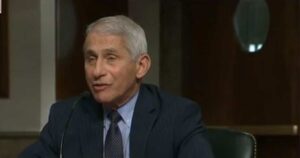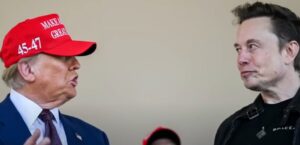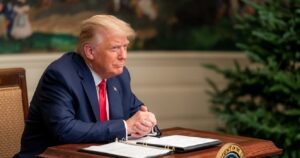Judge blocks Trump’s election integrity executive order
When executive orders are used to implement an agenda, they risk being challenged and struck down by judges.
Trump has been crushed with injunctions, and he was just hit with another one, this time it being his executive order for election integrity.
Americans Want More Election Integrity
Americans have been very clear about Voter ID and election integrity laws.
A poll taken prior to the election showed that 86% of Americans support using photo ID and proof of citizenship to cast a vote.
The breakdown was 98% of Republicans, 67% of Democrats, and 84% of Independents, so this should be something that is worked on in a bipartisan fashion by Congress, but Democrats continue to claim that voter ID is voter oppression.
Gallup explained, “Partisans’ views of most of the election law policies are generally stable; however, Democrats’ and Republicans’ opinions have each shifted significantly on one of them. Democrats are now 14 points more likely than they were in 2022 to support requiring photo identification to vote, and Republicans’ current 57% support for early voting—while not significantly different from 2022—is down from 74% in a 2016 survey.”
PRESERVING AND PROTECTING THE INTEGRITY OF AMERICAN ELECTIONS
In March 2025, Donald Trump introduced the executive order above, believing that he was implementing an order supported by the overwhelming majority of Americans.
The order, in part, stated, “Free, fair, and honest elections unmarred by fraud, errors, or suspicion are fundamental to maintaining our constitutional Republic. The right of American citizens to have their votes properly counted and tabulated, without illegal dilution, is vital to determining the rightful winner of an election.
“Under the Constitution, State governments must safeguard American elections in compliance with Federal laws that protect Americans’ voting rights and guard against dilution by illegal voting, discrimination, fraud, and other forms of malfeasance and error. Yet the United States has not adequately enforced Federal election requirements that, for example, prohibit States from counting ballots received after Election Day or prohibit non-citizens from registering to vote.”
The order, of course, was challenged and litigated.
Judge Blocks Trump
The challenge landed in the lap of Judge Colleen Kollar-Kotelly, initially appointed to the bench by Ronald Reagan, then elevated by Bill Clinton, and that was not good news for Trump.
Kollar-Kotelly struck the order down, stating, "Consistent with that allocation of power, Congress is currently debating legislation that would affect many of the changes the President purports to order. No statutory delegation of authority to the Executive Branch permits the President to short-circuit Congress’s deliberative process by executive order."
Here is the problem with most of Trump’s orders… the concepts are great, but they often go outside of his constitutional powers or are considered illegal due to current laws in place. Trump needs to get on Congress to start legislating rather than pushing out all these executive orders.
When he issued these orders, I estimated that about 90% of them would get struck down if challenged, and we are pretty much on that pace. The fact that Americans support these issues plays to his favor because if Democrats do not support them, it would give the GOP ammunition to use against them in the elections. Instead, it is Trump giving the Dems ammunition to use.




